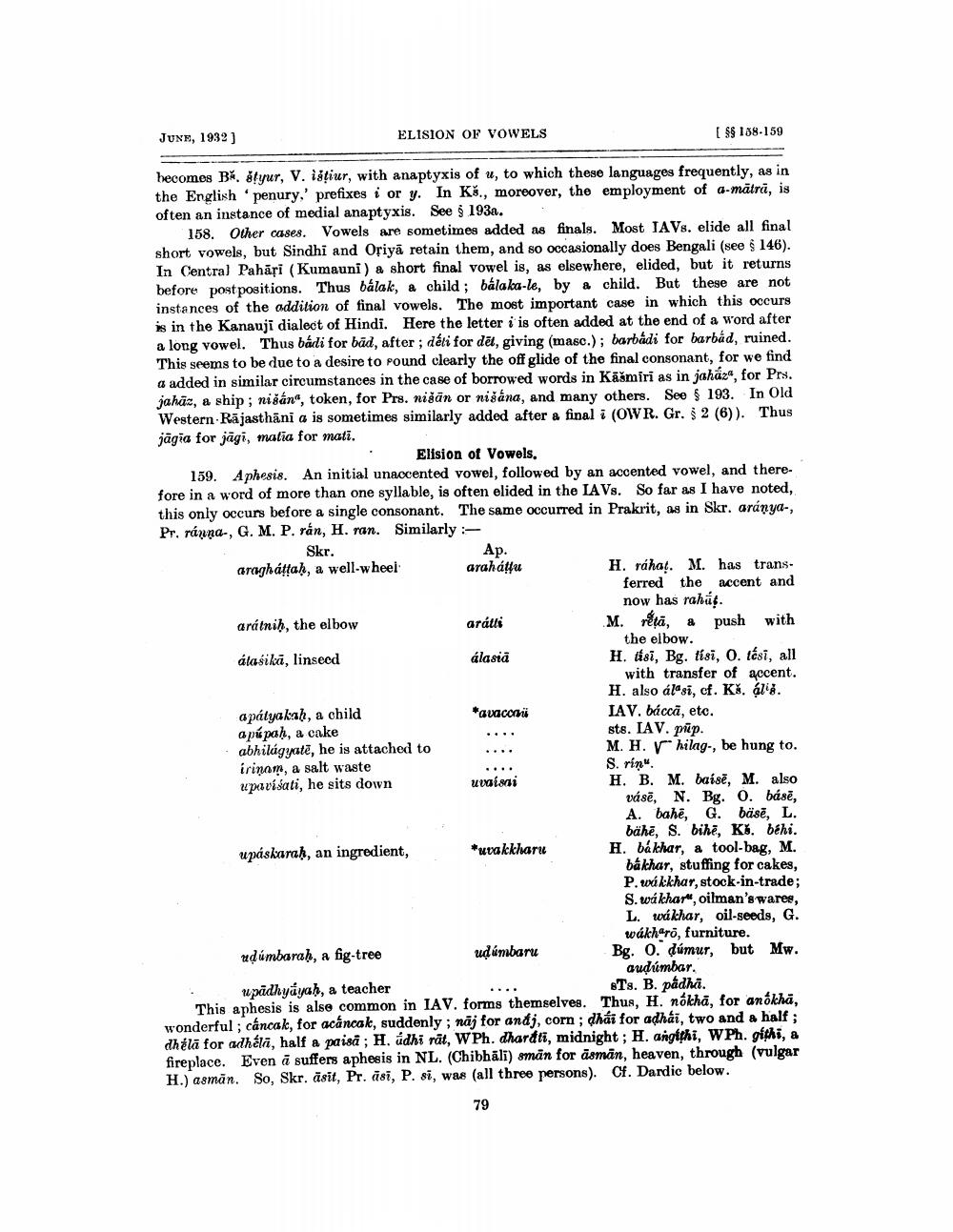________________
JUNE, 1932)
ELISION OF VOWELS
[ $$ 158-159
hecomes B. štyur, V. ištiur, with anaptyxis of u, to which these languages frequently, as in the English penury,' prefixes i ory. In Kš., moreover, the employment of a-mātrā, is often an instance of medial anaptyxis. See § 193a.
158. Other cases. Vowels are sometimes added as finals. Most TAVs. elide all final short vowels, but Sindhi and Osiyā retain them, and so occasionally does Bengali (see $ 146). In Central Pahāļi (Kumauni) a short final vowel is, as elsewhere, elided, but it returns before postpositions. Thus bálak, a child ; bálaka-le, by a child. But these are not instances of the addition of final vowels. The most important case in which this occurs is in the Kanauji dialect of Hindi. Here the letter i is often added at the end of a word after a long vowel. Thus badi for bâd, after; déli for dēl, giving (masc.); barbadi for barbad, ruined. This seems to be due to a desire to pound clearly the off glide of the final consonant, for we find a added in similar circumstances in the case of borrowed words in Kāšmiri as in jaháza, for Prs. jahāz, a ship; nišán", token, for Prs. nišān or nišana, and many others. See $ 193. In Old Western Rajasthani a is sometimes similarly added after a final i (OWR. Gr. § 2 (6)). Thus jagia for jāgi, malia for mati.
Elision of Vowels. 159. Aphesis. An initial unaccented vowel, followed by an accented vowel, and there. fore in a word of more than one syllable, is often elided in the IAVs. So far as I have noted, this only occurs before a single consonant. The same occurred in Prakrit, as in Skr. aránya-, Pr, ránna-, G. M. P. rán, H. ran. Similarly Skr.
Ap. aragháttah, a well-wheel arahálfu
H. ráhat. M. has transferred the accent and
now has rahág. arátnih, the elbow
aráuli
M. réta, & push with
the elbow. álasika, linseed
álasia
H. tisi, Bg. tísi, O. tési, all
with transfer of accent.
H. also álási, cf. K. ális. apatyakah, a child
*avacom
LAV. báccă, etc. apúpah, a cake
sts. IAV. prp. abhilágyatē, he is attached to
M. H. r hilag., be hung to. irinom, a salt waste
S. rinu. upavišati, he sits down
uvaisi
H. B. M. baisē, M. also vásē, N. Bg. 0. básē, A. bahē, G. bäsē, L.
bähe, s. bihe, Ks. béhi. upáskaraḥ, an ingredient, *uvakkharu H. ba khar, a tool-bag, M.
bakhar, stuffing for cakes, P.wikkhar, stock-in-trade; S.wakhar", oilman's wares, L. wákhar, oil-seeds, G.
wakharo, furniture. udúmbaraḥ, a fig-tree
udumbaru
Bg. 0. dúmur, but Mw.
Gudumbar. upādhyáyah, a teacher
Ts. B. padha. This aphesis is also common in IAV. forms themselves. Thus, H. nókhă, for anokha, wonderful; câncak, for acáncak, suddenly ; naj for andj, corn; dhái for adhái, two and a half; dhélā for adhéla, half a paisa ; H. ádhi rat, W Ph. dhardti, midnight ; H. angithi, WPh. githi, a fireplace. Even a suffers aphesis in NL. (Chibhālī) eman for asmān, heaven, through (vulgar H.) asmān. So, Skr. ăsit, Pr. āsi, P.si, was (all three persons). Cf. Dardie below.




